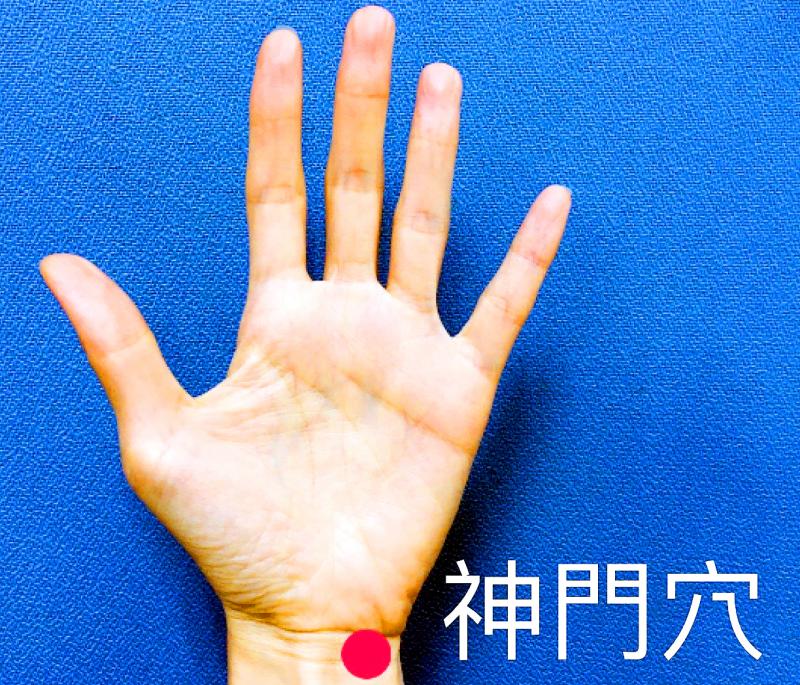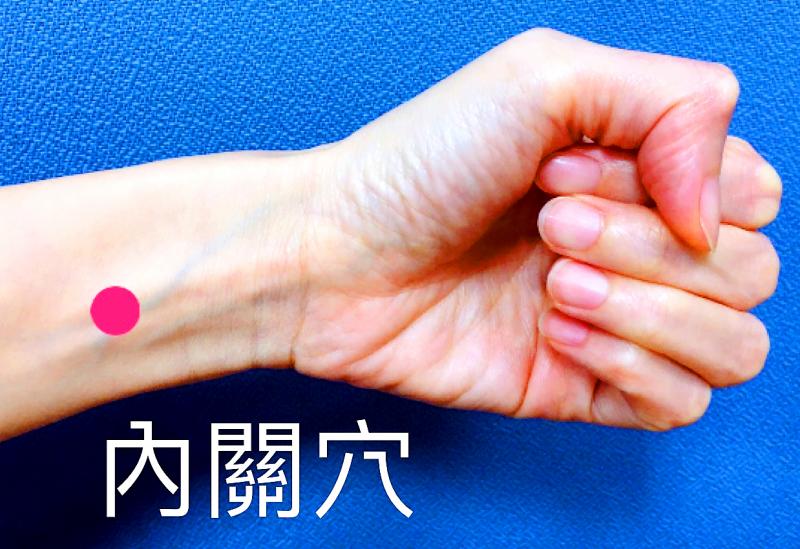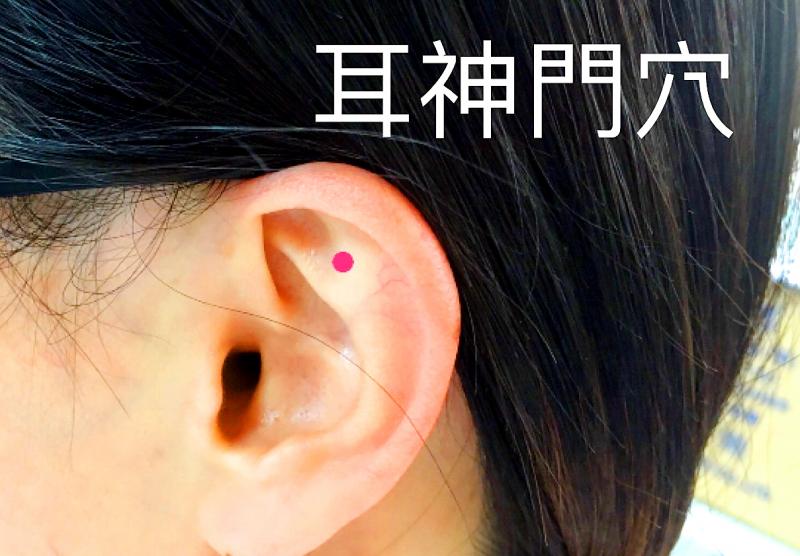As the COVID-19 pandemic continues to spread around the globe, uncertainty surrounding the virus is causing anxiety and fear. Yen Su-mei, director of the Department of Chinese Medicine at the Ministry of Health and Welfare’s Nantou Hospital, says that long-term anxiety induced by the pandemic can lead to symptoms including headaches, insomnia, nightmares, fatigue and irritability, as well as mental and physical atrophy. When you begin to feel tense, Yen recommends applying gentle pressure to three acupressure points on the body, as a way to reduce stress and calm your nerves.
According to Yen, applying pressure to the three acupressure points — called neiguan (PC-6), shenmen (HT-7) and ear shenmen (MA-TF1) — can help relax one’s mood and aid sleep, and can be carried out anytime at home to maintain overall well-being.
1. Shenmen: With your palm facing toward you, find the intersection between the little finger and ring finger and follow the line down to the lateral crease of skin where the wrist meets the hand. Try pressing down at this spot and you will be able to detect a hollow area underneath the muscle: this is the shenmen acupressure point.

Photo courtesy of Nantou Hospital
照片:南投醫院提供
2. Neiguan: With your palm facing toward you, place your finger at the center point of the lateral crease where wrist meets the hand. Move your finger downwards in the direction of the elbow, moving the width of three fingers. You will be able to detect a hollow area between two muscles: this is the neiguan acupressure point.
3. Ear shenmen: To locate the ear shenmen, place your finger on the upper edge of the ear. Slowly move your finger down until you find a small hollow. Moving away from the direction of your face, move your finger up out of the hollow, approximately one-third of the way along the adjacent raised section of skin. This is the ear shenmen acupressure point.
Yen advises you do not need to use excessive pressure while pushing down and slowly rotating the pad of your finger against the acupressure points. If you begin to feel soreness, pins-and-needles, a bloated sensation or a dull aching feeling, the acupressure is beginning to take effect and relieve tension in your body, Yen says.

Photo courtesy of Nantou Hospital
照片:南投醫院提供
(Translated by Edward Jones, Taipei Times)
中國武漢肺炎疫情在各國持續蔓延中,由於對疾病的不確定性,引起部分民眾焦慮恐慌。衛生福利部南投醫院中醫科顏素美主任表示,防疫期間,持久的緊張焦慮,常見頭痛、失眠、多夢、醒後困倦、腦力衰退、體力衰退、心情煩躁等症狀。當初現情緒緊繃狀態時,不妨試試揉壓三個穴位,來紓壓平定心情。
顏素美主任表示,人體穴位中有三穴位能鎮靜心情,幫助睡眠,包括內關穴、神門穴和耳神門穴,平時可按此三穴道做自我保養。

照片:南投醫院提供
(一)神門穴:由小指和無名指的交叉處向下延伸到手腕的橫紋,二者的交接點,筋內側凹陷處便是神門穴。
(二)內關穴:由掌面的腕橫紋中間向肘方向延伸三橫指長度,在兩筋之間的凹陷處便是內關。
(三)3.耳神門穴:耳上第一凹窩上緣,外三分之一處就是耳神門穴。
顏素美主任表示,按壓穴位時,不需要過度用力揉壓,當感覺到酸、麻、脹、痛時,便可達到緩解的效果,消除緊繃情緒。
(自由時報記者張協昇)

The 2025 Seoul International Book Fair was held from June 18 to 22 at the COEX Convention & Exhibition Center in Seoul, South Korea. This year, participants from 17 countries attended, with over 530 publishing houses and related organizations taking part. For the first time, Taiwan participated in the book fair as the Guest of Honor, bringing together more than 85 publishers and presenting a curated selection of 550 titles. A delegation of 23 Taiwanese creatives traveled to Seoul to attend the event, including 13 literary authors, six illustrators, and four comic book artists, among which were a film director, an

The new generation born between 2025 and 2039 has been officially named “Generation Beta,” or simply “Gen Beta.” This generation will be the first to experience a world where artificial intelligence (AI) plays a key role in daily life. Generations are defined by shared cultural, social and historical experiences within a specific time frame. These experiences, often influenced by significant events and technological advancements, shape the values, attitudes and behaviors of each generation. The concept of generations helps us understand how different age groups interact with their environment and contribute to societal changes over time. The previous generational transition from Gen

In late 2024, the suicide of acclaimed Taiwanese author Chiung Yao at 86 sparked a societal debate. She expressed her desire to avoid the difficult aging process and sought to govern her own death rather than leave it to fate. Her statements propelled the issue of “euthanasia” back into the public arena, posing the question of whether Taiwan should legalize euthanasia to grant patients and the elderly the right to die with dignity. Euthanasia, the intentional ending of a life to relieve suffering, is legal for humans in countries like the Netherlands and Belgium but remains prohibited in Taiwan.

Continued from yesterday(延續自昨日) https://www.taipeitimes.com/News/lang As Gen Beta grows, they are expected to witness advanced technologies becoming fully integrated into various fields like education, workplaces, healthcare and entertainment. In addition to technological developments, they will also face big challenges like severe climate change. Influenced by their Gen Y or Gen Z parents, who view climate change as a critical issue for the future and prioritize sustainability, they are likely to focus more on global issues and seek innovative solutions to address them. Moreover, Gen Beta will experience considerable demographic changes, such as lower birth rates and longer lifespans. Consequently, Gen Beta is predicted to